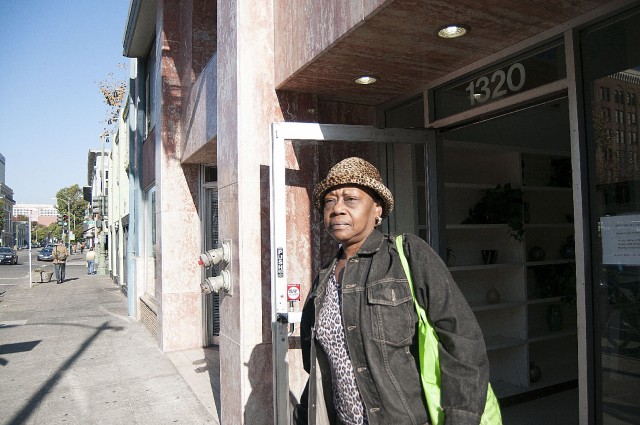But Wilson said equally important to her medical care is the bevy of other resources the clinic provides: food, housing assistance, free transportation, nutrition classes, and substance abuse counseling.
"This place is the reason I'm not homeless — it's my lifeline," she said on a recent day as she picked up her weekly allotment of vegetables.
It's because of a federal program commonly referred to as Ryan White that clinics like AIDS Project of the East Bay can afford to provide that range of other services, in addition to primary and specialty care. Ryan White funds are divvied out to clinics that offer these services for low-income, HIV-positive patients and people with AIDS to provide a broad spectrum of care — from being able to purchase a bus ticket, to scheduling a medical appointment, to buying groceries with food vouchers.
For Wilson and hundreds of others in Alameda County who are poor and chronically ill, the program is critical. Ryan White, passed by Congress in 1990 to provide life-saving health care for the poor and uninsured, is credited with building some of the first effective coordinated care for people with the disease.
But the future of Ryan White is uncertain.
The program expired at the end of September, although Congress approved its continuance without an official reauthorization.
As of Jan. 1, as part of the Affordable Care Act, California is expanding Medi-Cal, the state's version of Medicaid, and will allow childless adults making less than $15,856 a year to sign up.
That means that the vast majority of low-income Californians who currently use Ryan White funds for their medical care will move into Medi-Cal on Jan. 1.
The transition of poor, sick people living with HIV or AIDS moving from one public program to another has ignited concerns among patient advocates and nonprofits that provide care for a population whose health relies on stable medical homes and expensive antiretroviral medications.
Patient advocates say Ryan White remains important because it can pay for the other necessities that HIV/AIDS patients find crucial.
"Health reform has been challenging for us in a number of ways," said Alvan Quamina, the executive director for the AIDS Project of the East Bay, which provides services for about 700 people in Alameda County annually. "Though long-term benefits are obvious, health reform means funding streams for HIV services are in jeopardy."
Alameda County HIV specialists argue that Ryan White is critical for clinics to provide the services that make daily life possible: transportation, counseling, housing assistance, and emergency food..
"Ryan White will continue to be important to provide the ancillary support services," Quamina said. "While primary care transitioning to Medi-Cal, Ryan White can pay for things like BART fare or a free bus pass, food vouchers, and peer counseling," he said.
PUBLIC HEALTH BENEFIT
Keith Waltrip, the acting director for the Alameda County Office of AIDS Administration, agreed that Ryan White is critical to ensure a continuum of care for patients with sensitive health needs.
"Support services help get these low-income people into care," Waltrip said. "So making sure they have transportation, and healthy food, and psycho-social services is important. Those services aren't going to be paid for under Medi-Cal, so that's where Ryan White comes in."
Waltrip said those services benefit not only the health of an individual, but also the health of a community.
"There is a public health benefit of keeping patients in care," Waltrip said. "Continuous treatment reduces their viral load, and decreases their chances of passing along HIV to another individual, thus reducing the number of infections in a community."
Kathleen Clanon is an HIV specialist and the interim chief medical officer for the Health Program of Alameda County. She is overseeing the transition of Ryan White patients to Medi-Cal.
Clanon said Alameda County is ahead of the curve in aggressively preparing for the transition of Ryan White patients to Medi-Cal, or Covered California — whichever program patients are eligible for, depending on income.
Each of the county's six HIV specialty clinics will welcome new Medi-Cal patients after ACA implementation — something the county has been negotiating since January. That will mean better access to health care for the low income and a reduction in the likelihood for patients having to switch providers, Clanon said.
Though the long-term future of Ryan White is uncertain, Clanon said she expects it to remain in place at least through 2014, in some capacity.
Other county health officials agreed, and said that meanwhile, HIV workers are advocating for the program's continuance at the local, state and federal levels.
"It's unclear where we're headed, and it really doesn't look good," Quamina said. "What we're hearing is we should start planning, but my response is we're going to prepare, but we need to fight."
For patients like Wilson, the shaky future of the program that she relies on is worrisome.
